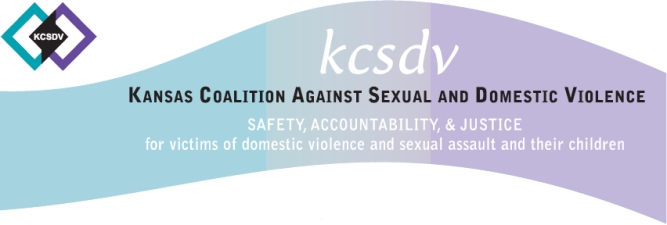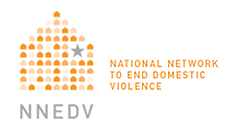Winter 2009 Newsletter

The Kansas Coalition Against Sexual and Domestic Violence (KCSDV) participated in the National Network to End Domestic Violence’s 2008 Domestic Violence Counts Census. This annual census collects an unduplicated count of adults and children seeking services from domestic violence programs in the United States during a 24-hour survey period.
The census includes information on the type of program and the number of people served in an emergency shelter, in transitional housing, and in non-residential services. Also reported were the number of hotline calls, trainings or public education sessions conducted, and the number of individuals who were unable to be served during the 24-hour period.
The results from the census will assist KCSDV in quantifying the need for legislative reforms, will help establish priorities for improving existing services or creating new services for survivors, and will assist in enhancing community outreach and volunteer support.
KCSDV is proud to announce that 100 percent of Kansas’ eligible member programs reported data regarding the number of people served in the 24-hour survey period, which was September 17, 2008.
“The information gathered will help KCSDV paint a picture of domestic violence in Kansas,” said Patty Jordan, KCSDV rural housing specialist. “We are very pleased to have 100 percent participation this year.”
To view the Kansas Summary, go to 2008 Domestic Violence Counts: National Census of Domestic Violence Services, Kansas Summary.
“Demand for services has gone up – in fact, we sheltered 20 percent more clients this year compared to the past year.”
Quote from a Kansas domestic violence shelter director.
During the month of January, communities across the country observed National Stalking Awareness Month, a time to focus on a crime that affects 1.4 million victims each year. The Office on Violence Against Women of the U.S. Department of Justice reports that one in 12 women and one in 45 men will be stalked in their lifetime, for an average duration of almost two years.
Stalking is a serious crime in all 50 states and the District of Columbia. Unlike other crimes, stalking is a series of acts – a course of conduct directed at a specific person that would cause that person fear. Victims may experience psychological trauma, financial hardship and even death. Stalking can take many forms, from unwanted cards, calls, gifts or visits, to assaults, threats, vandalism, burglary and animal abuse. Stalkers may use a range of devices to track their victims’ daily activities, and many stalkers have followed their victims from one jurisdiction to another.
Stalking has close ties to domestic and sexual violence. Nationally, 81 percent of women stalked by an intimate partner were also physically assaulted by that partner, 31 percent of women stalked by an intimate partner were also sexually assaulted by that partner, and 76 percent of female homicide victims were stalked prior to their death.
“Whether stalking is committed by an intimate partner or a stranger, stalking has a devastating impact on the victim,” said Sandy Barnett, executive director of the Kansas Coalition Against Sexual and Domestic Violence. “By learning more about stalking, communities can support victims, hold offenders accountable, and prevent future tragedies,” Barnett said.
In 2008, the Kansas Legislature amended the state’s stalking statute, making it easier to charge and prosecute stalkers. The statute also recognizes stalkers who may pose the most danger by imposing an additional penalty for perpetrators who violate a protection order or have a prior conviction for stalking.
KCSDV offers information about stalking and how to obtain a Protection from Stalking Order at www.kcsdv.org/pfs.html. For additional information about National Stalking Awareness Month, please visit www.stalkingawarenessmonth.org and www.ovw.usdoj.gov.

The stalking awareness ribbon’s reflective, colorless surface illustrates not only the invisibility of the crime (to everyone except the victim), but also mirrors what stalking victims often report they experience – the need to constantly check over their shoulder for the stalker.
Sexual violence continues to have a devastating impact in Kansas, and in 2008, the Kansas Coalition Against Sexual and Domestic Violence recognized and responded to the need for a coordinated, comprehensive state-wide response plan to address sexual violence. This State Response Plan will help guide future anti-sexual violence work throughout the state. Advocates will be able to use this plan within their communities to focus their efforts on behalf of victims and survivors of sexual violence. KCSDV anticipates publication of the plan in early 2009.
KCSDV thanks the advisory committee that developed and reviewed the State Response Plan. Committee members included representatives from the Governor’s Grants Office, the Attorney General’s Office, the Kansas Association of Centers for Independent Living, Northwest Kansas Domestic & Sexual Violence Services, The Crisis Center Inc., Wichita State University, Hays Police Department, Office of the Crawford County Attorney, Lenexa Police Department, the Metropolitan Organization to Counter Sexual Assault, Kansas Department of Corrections Victims Services, GaDuGi SafeCenter, Via Christi Regional Medical Center, the Office of the Riley County Attorney, and the Wichita Area Sexual Assault Center.
For more information, contact Laurel Klein Searles, KCSDV staff attorney, at lkleinsearles@kcsdv.org or (785) 232-9784.
In the summer of 2008, a task force convened by the Kansas Bureau of Investigation (KBI) discussed the statewide implementation of HB 2726, which amended K.S.A. 65-448, the law governing Sexual Assault Evidence Collection Kits.
The amendments to K.S.A. 65-448, driven by Congressional mandates contained in the 2005 Violence Against Women Act, now allow a victim of sexual assault to request that a sexual assault evidence collection kit be performed without a report to law enforcement. Previously, only a law enforcement officer could request evidence collection after a rape or sexual assault.
While it may seem counter intuitive to allow collection of evidence without a report to law enforcement, this new law works in the favor of the victim, giving the victim the ability to seek support and gather information before making the critical decision to involve the criminal justice system. KCSDV believes that with the support of an advocate, it is more likely that the victim will choose to make a report.
In reviewing implementation of the legislation, the task force members also discovered that the materials provided in the sexual assault evidence collection kits would need revisions. They took this opportunity to improve both the instructional information for health care providers, as well as the materials that are available to victims, in an effort to improve the sexual assault forensic exam for all parties involved.
Health care providers will now have the benefit of a more thorough set of instructions to help guide them through the exam, and victims that receive a forensic exam will now receive a Frequently Asked Questions brochure, as well as information from the Crime Victims Compensation Board and the statewide crisis hotline.
The KBI’s task force consisted of staff from KCSDV, the Governor’s Grant’s Office, the Kansas Hospitals Association, the Kansas Department of Health and Environment, Via Christi Regional Medical Center (Sexual Assault Nurse Examiner program), and the KBI.
For more information, contact Laurel Klein Searles, KCSDV staff attorney, at lkleinsearles@kcsdv.org or (785) 232-9784.
Wichita has been selected as one of eleven national sites to participate in a new teen dating violence and abuse prevention initiative funded by the Robert Wood Johnson Foundation (RWJ). Chosen from more than 500 applicants, the “Wichita Building Healthy Teen Relationships” project will receive up to $1 million dollars over the next four years to implement its program. In addition, project coordinators will receive intensive technical assistance and training from the Family Violence Prevention Fund and the RWJ Foundation.
Wichita Area Sexual Assault Center logo”This [grant] is the next logical step to the work we have been doing with our DELTA-funded “Choose Respect” campaign in our schools. This grant will allow us to add staff within the schools to help shape policy and provide training on curriculum that we hope will become part of the standard educational experience for all middle school students in the Wichita Public Schools,” said Nancy Carroll, Catholic Charities – Harbor House violence prevention coordinator.
The “Wichita Building Healthy Teen Relationships” project is designed to reach 7,750 teens through community activities focusing on forming healthy relationships and ending intimate partner violence. Wichita’s project will specifically engage teens and those who influence teens at schools, at after-school sites, and through ally organizations, such as Youth United for Positive Action (YUPA).
This new initiative will also expand the existing local violence prevention education programs that provide outreach to students, school staff, and parents in Wichita — the Domestic Violence Prevention Enhancements and Leadership through Alliances (DELTA) and Sexual Violence Prevention and Education (SVPE) projects.


“The addition of the RWJ initiative in Wichita is a tremendous opportunity to build upon existing innovative sexual and domestic violence prevention initiatives in Kansas,” said Deborah Zelli, Kansas Coalition Against Sexual and Domestic Violence’s prevention projects team leader. “Being able to expand upon existing information on best practices for primary prevention will assist us in our shared goal of ending sexual and domestic violence.”
The Wichita project is a collaborative partnership among Catholic Charities Harbor House, Wichita Area Sexual Assault Center, Wichita/Sedgwick County Domestic Violence and Sexual Assault Coalition, Wichita Public School District, and the Wichita State University Department of Sociology and Center for Community Support and Research.
For more information, please contact Deborah Zelli, KCSDV’s prevention projects team leader, at dzelli@kcsdv.org or (785) 232-9784.
What is GTEAP?
In 2006, the Office of Kansas Governor Kathleen Sebelius was awarded a federal Grant to Encourage Arrest and Enforcement of Protection Orders (GTEAP). The Kansas Coalition Against Sexual and Domestic Violence, the Kansas Law Enforcement Training Center, and other ally organizations participate in the GTEAP grant initiatives.
The Kansas GTEAP project
The goal of the Kansas Grant to Encourage Arrest and Enforcement of Protection Orders (GTEAP) project is to develop policies, protocols, best practices, and training curricula for all professions within the criminal justice system, so that all professions can provide a consistent response to victims of domestic violence.
In an effort to develop relevant policies and training curriculum for law enforcement officers, a law enforcement subcommittee, which included KCSDV project staff, developed a domestic violence training curriculum.
The Law Enforcement Curriculum
The Law Enforcement Curriculum includes the following topics:
1. An overview of domestic violence
2. On-scene arrival
3. The arrest decision
4. The investigation
5. Advocacy
6. Protection orders
7. Immigration
8. Rural and cultural considerations
9. Legal and liability issues
10. Strangulation
11. Stalking
12. Children and domestic violence
This completed curriculum was approved by the Governor’s Advisory Council on Domestic Violence Training and the Office on Violence Against Women of the U.S. Department of Justice in July 2008.
The Training Teams
Teams of three or four trainers, which include law enforcement officers and advocates, are covering each of the four geographic regions in Kansas. In September 2008, all of the regional training teams participated in a three-day “train the trainer” event, which provided detailed information about the curriculum. Each regional training team will schedule at least one training event in their geographic region before June 30, 2009.
Find out more about these training events on the KCSDV website at www.kcsdv.org, the Kansas Law Enforcement Training Center website at www.kletc.org, or by calling Sara Rust-Martin, KCSDV criminal justice projects attorney at (785) 232-9784.
The Kansas Governor’s Grants Program collaborated with the Docking Institute of Public Affairs at Fort Hays State University to design the 2007 “Domestic Violence Victim Services: Awareness, Use and Satisfaction Project.” The project was guided by the following research objectives:
1. Estimated prevalence of domestic violence incidents among adult Kansas women in the past year.
2. Prevalence and type of help victims are seeking in Kansas via service providers, family & friends, and law enforcement officers.
3. Identification of barriers for victims seeking service, including emotional and instrumental barriers.
4. Prevalence of reporting abuse to Kansas law enforcement.
5. Incidence of met and unmet needs, including medical, counseling, legal, other instrumental assistance.
6. Estimate known abuser correlations to the following: gun ownership, alcohol/drug use, joblessness, pet abuse, etc.
7. Examine the socio-demographic characteristics of all respondents
8. Estimate the awareness level among respondents for available services and sources of information about services.
See the highlights of the results of the “2007 Domestic Violence Victim Services: Awareness, Use and Satisfaction Project” or view the entire report. (Both are pdf documents.)

The Kansas Coalition Against Sexual and Domestic Violence was awarded a $52,000 grant by The Allstate Foundation Domestic Violence Program. Kansas is one of nine state coalitions to receive this grant, which will allow KCSDV and its member programs to expand economic empowerment initiatives in Kansas.
Why is economic empowerment a priority?
Perpetrators often use economic abuse as a means to control their partners, so long-term financial security is essential for a victim?s safety. Advocacy efforts often focus on legislative, policy and program initiatives intended to provide safety for victims and accountability for batterers.
“We must tap into all available resources to assist survivors in removing economic barriers to their safety and long term survival,” said Mary Bradshaw, KCSDV economic justice coordinator. “We are grateful to The Allstate Foundation and the National Network to End Domestic Violence (NNEDV) Fund for supporting our efforts to create new and innovative solutions to complex problems.”
“Project F.I.S.H”
KCSDV and Women’s Transitional Care Services (WTCS) are past recipients of funding from the Allstate Foundation Domestic Violence Program. This new funding will allow WTCS to expand its services and continue its leadership role in financial literacy and economic advocacy.
This funding will also enhance the economic empowerment initiatives of three additional member programs — SAFEHOME in Overland Park, SOS in Emporia, and StepStone in Wichita. “Project F.I.S.H.: Financial Independence, Strategies and Healing” includes the implementation of the Allstate Financial Empowerment Curriculum. In addition, SAFEHOME and SOS will provide financial literacy classes in Spanish for Latina survivors, WTCS, StepStone and SOS will utilize the Individual Development Account (IDA) element, and SAFEHOME plans to enhance its existing job-readiness services.
Bradshaw says that the four participating programs will be in unique positions to serve as models and mentors as Kansas moves forward in the quest for economic advocacy for all. Project F.I.S.H will be funded from December 1, 2008 through November 30, 2009.
The Allstate Foundation Domestic Violence Program
The Allstate Foundation Domestic Violence Program is part of an ongoing initiative to provide economic empowerment services and support to domestic violence survivors nationwide. The Allstate Foundation, in alliance with the National Network to End Domestic Violence (NNEDV) Fund and its affiliated state coalitions, provides resources to support survivors of domestic violence.
For more information, contact Mary at mbradshaw@kcsdv.org or (785) 232-9784.


The Domestic Violence and Mental Health Policy Initiative (DVMHPI) is a Chicago-based project designed to address the unmet mental health needs of domestic violence survivors and their children. Since 1999, DVMHPI has been working to enhance the collaboration between the mental health system and victim service providers nationwide.
Recently DVMHPI received a grant to continue its work, and the Kansas Coalition Against Sexual and Domestic Violence was invited to participate in the new grant initiatives. Over the course of the next three years, DVMHPI will assist KCSDV in developing a needs assessment, and providing technical assistance for the development and implementation of a strategic plan, which will provide Kansas survivors with more seamless options for mental health services.
Programs across the state struggle to find local mental health providers that are well versed in the area of trauma as it relates to domestic and sexual violence, so KCSDV is excited to participate in this new initiative,? said Stacey Mann, KCSDV director of advocacy services.
On average, over half of the women seen in a range of mental health settings are either currently experiencing or have experienced abuse by an intimate partner. Many have endured multiple forms of abuse throughout their lives, putting them at greater risk for posttraumatic mental health problems.
A cross section of studies of battered women confirms the following statistics:
- Post Traumatic Stress Disorders ranged from 54-84 percent
- Depression ranged from 63-77 percent
- Anxiety ranged from 38-75 percent
The project will begin in the fall of 2009. Please contact Stacey at staceym@kcsdv.org or (785) 232-9784 for more information.
Portions of this article were reprinted with permission. www.dvmhpi.org
Q: Are there any new books that explain domestic violence?
A: As a matter of fact, there are a few, but one that I highly recommend is “Coercive Control, How Men Entrap Women in Personal Life” by Evan Stark. Stark details how abusive men can use coercive control to extend their dominance over time and through social space, in ways that both isolate and control women?s lives. He analyzes three cases of women who committed crimes in the context of abuse.
While the book is a bit long and can sometimes be an academic read, the manner in which Stark frames coercive control in both the personal and societal spheres is remarkable. Aside from being an author, Stark is an award-winning researcher and founder of one of the first shelters for abused women in the United States.
Glad you asked,
Stacey Mann, KCSDV director of advocacy services
staceym@kcsdv.org or (785) 232-9784.
KANSAS CRISIS HOTLINE: 888-END-ABUSE | 888-363-2287